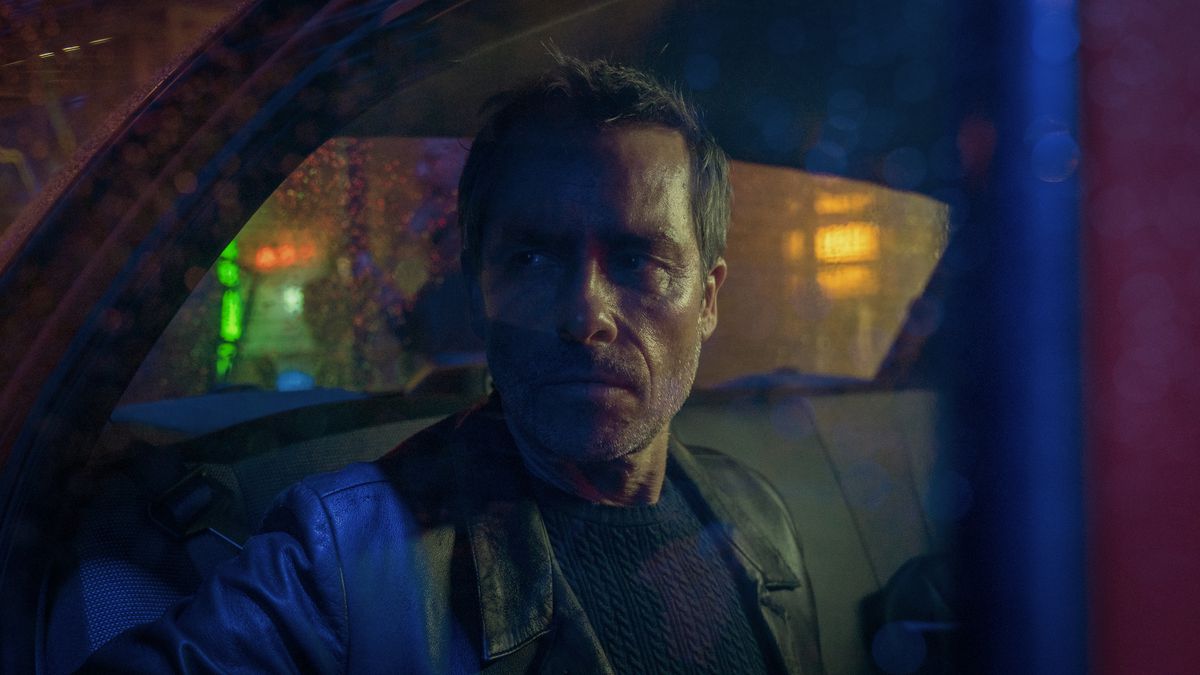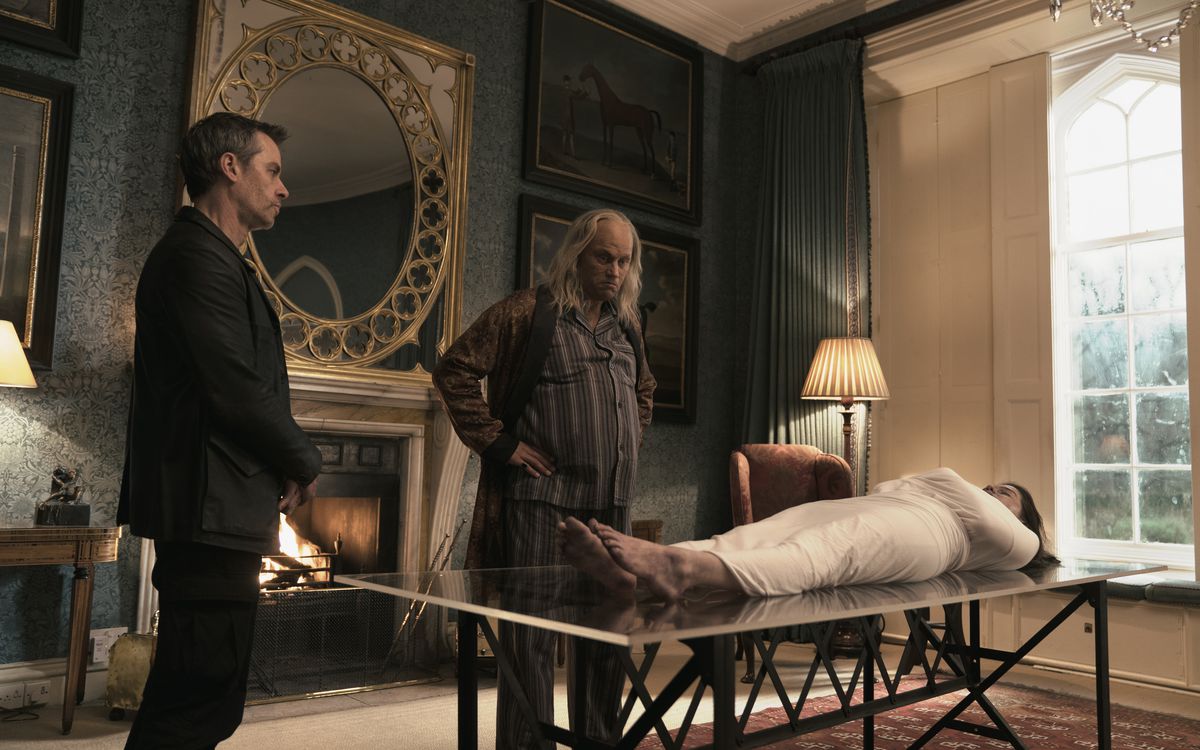If mimicry is flattery, then Ridley Scott and Denis Villeneuve should be honored by Zone 414, an indie science fiction movie that takes so much from Blade Runner and Blade Runner 2049 that it’s surprising director Andrew Baird and screenwriter Bryan Edward Hill avoided legal action. The Blade Runner films have cast an impenetrable shadow across sci-fi, and it would be silly to deny their visual and narrative impact. But the ways Zone 414 lifts from its predecessors, borrowing elements from character development to costuming to questions about the utilitarianism of our physical bodies, denies it identifiable or entertaining qualities of its own.
The only truly singular element of Zone 414, aside from the strangeness of Guy Pearce sleepwalking through a Mark Wahlberg impression, is an ugly flirtation with misogyny that should make anyone who accused Blade Runner 2049 of hating women realize, “Nope, this is what dehumanizing women actually looks like.” Putting female nudity onscreen isn’t inherently sexist, and women can die in movies without being sexualized. But Zone 414 manages to do both these things the wrong way. Baird cuts back and forth between the film’s primary plot and first-person shots of abuse of a woman that looks like it came from a snuff film. He includes an unnecessary scene featuring topless women, to needlessly reiterate the established plot point that the story’s synthetic humans are primarily used as sex slaves. And he and Baird only indicate characters are villains by having them abuse women.
Apparently no other crimes exist in this reality other than those targeting women, and yet Zone 414 fails to say anything meaningful about the ethical and physical trespasses against them. Men hate women, Zone 414 announces as if it were a revelation. But acknowledging a demoralizing reality in the most didactic way possible does not make Zone 414 a “technological snowflake, beautiful and unique,” as one of the film’s characters describes a synthetic sex slave. It makes the film boring.

Photo: Saban Films
The film follows David Carmichael (Pearce), a washed-up detective turned private investigator who somehow has both a Boston accent and a New York accent. David takes his sneers, disaffected attitude, and memories of his dead cop partner and his dead wife (because what else would a sad detective’s domestic life include?) to London, where he enters a cell with a woman, ignores her pleading for her life, and puts a bullet in her forehead. It’s a jarring, unnerving introduction that tips quickly into genre territory when David peels back the woman’s scalp and reaches into her skull to retrieve a mysterious mechanical core.
Nothing external about this woman initially revealed her engineered status; physically, she was indistinguishable from a biological human. But David went through with the killing as a no-questions-asked part of a job interview with the wealthy Joseph Veidt (Jonathan Aris). Is it still murder if the person being killed is a synthetic? Zone 414 toys with this question throughout the film, but initially, David is unconcerned. “I know what’s alive and what isn’t,” David says, and that’s enough to convince Joseph to hire him.
The job seems straightforward. Joseph’s brother, genius inventor and kooky recluse Marlon (Travis Fimmel, jarringly unrecognizable under layers of orange bronzer and a stringy wig, and going for a “Marlon Brando in The Island of Dr. Moreau” vibe), made his fortune by designing synthetics, which he specifically manufactured as playthings for the rich and elite. The synthetics live in the enclosed city Zone 414, the only place where it’s legal for humans to interact with them.
Marlon’s daughter Melissa (Holly Demaine), who loathed her father’s legacy, often fled to Zone 414 — and she’s been abducted. Someone is sending Marlon videos of his daughter bound, injured, and terrified, and David needs to find her while also keeping the incident quiet. If the people in power think the synthetics in Zone 414 are out of control, they’ll shut it down, and there goes Marlon’s fortune. “My Eden is fragile,” Marlon warns David. To help out, Marlon tells David where to find Melissa’s only friend, a synthetic named Jane (Matilda Anna Ingrid Lutz, trying her best with a narrow script).
When David finally makes his way to Jane’s apartment in Zone 414, he learns she’s suicidal and is being stalked. She and covers up her concern for Melissa with resignation toward their outsider status: “I’m the metal girl who wanted to be real, and she’s the human girl who wants to be a machine. It’s nice and corny.” Through some programming flaw, Jane might be able to actually feel the emotions she’s only supposed to think she’s feeling, which manifest primarily in self-harm and suicidal ideation. That complicates David’s feelings toward her, forcing him to reconsider his initial dismissal of synthetics as “not human enough” to deserve his empathy or help.

Photo: Saban Films
An array of other characters pop up to threaten and abuse the film’s synthetic women, because that’s apparently the only way Baird and Hill can imagine raising Zone 414’s stakes. One man growls at a synthetic to repeat “I love you” over and over. Another leaves threatening voicemails for Jane that describe his fantasies of killing her. Yet another brags about the synthetic he sadistically treats as a plaything, with her scars revealing the engineering under her skin that keeps her alive for this torture.
If Baird and Hill bothered to spend as much time developing their film’s female characters as they do portraying their victimization, that might have been tolerable. (At least Blade Runner 2049 shaped Sean Young’s digital Rachel, Sylvia Hoeks’ Luv, Robin Wright’s Lt. Joshi, and Ana de Armas’s Joi — whose costuming is directly copied here for Jane — into fully fledged characters before sending them to their deaths.) There’s no such luck for Melissa or Jane, for whom Zone 414 demands immediate and unwavering sympathy, even as the only thing we know about them is that they’ve been inserted into one dangerous and demeaning situation after another.
It all feels like an undercover drinking game for Blade Runner references: Zone 414’s neon billboards, Asian food stalls, and omnipresent rain. Synthetic bodies nude under sheets of plastic. Marlon’s deranged ranting about being “the god of power” because of his ability to create life. A potential love story between a weary gumshoe who denies his emotions, and a cyborg who wants to be a real woman. Watch Zone 414 at your own risk — both in terms of alcohol consumption, and in terms of the mental exhaustion from dragging through this much tedious, devaluing muck.
Zone 414 premieres in limited theatrical release and on digital rental services on September 3.
Polygon – All
Source link
Related Post:
- First Blade Runner: Black Lotus trailer debuts at SDCC 2024
- Blade Runner: Black Lotus Anime Begins Fall 2024
- Watch Blade Runner: Black Lotus anime’s opening out of Crunchyroll Expo
- I gave Sensorium’s new breed of AI NPC a Blade Runner Voight-Kampff empathy test
- Audio: VideoGamer Podcast #414: Robots and Revolutions
- Impressive Film Made in Dreams, Noguchi’s Bell, Takes to Kickstarter for Full Animated Series
- Icarus is a brutal survival game designed to “feel like Skyrim”
- Bladepoint review — Beautifully brutal combat
- Eldest Souls Animated Trailer Sets The Scene For Brutal Boss Battles
- The King of Dinosaurs Makes A Brutal Return in a New KOF XV Trailer
